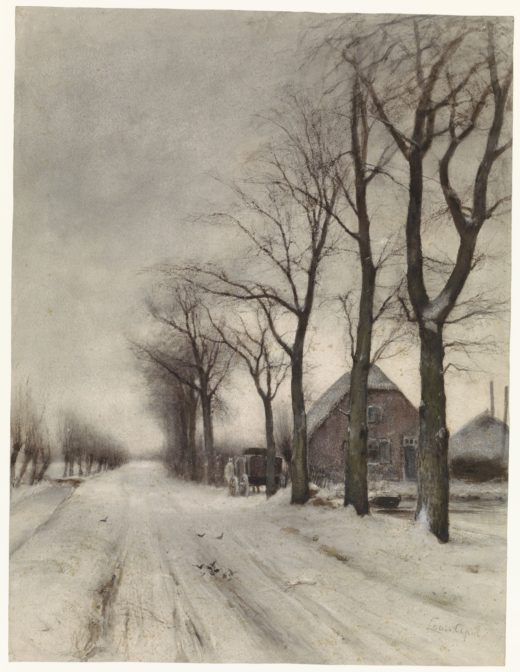If your ancestors left the Netherlands in the 1800s, chances are that they came from poor areas of the Netherlands such as East-Groningen, Friesland, Gelderland, Zeeuws-Vlaanderen, Limburg, or East-Brabant. These agricultural communities were hit hardest when the potato famine struck in the 1840s, and later when cheap American grain flooded the market.

Farm in the winter. Credits: Louis Apol, collection Rijksmuseum (public domain)


Would you be willing to provide some specific details regarding the timing in the 1840’s potato famine? and more about the cheap American grain glut? I was aware of the potato famine in Ireland, but am not fully aware of how much the Dutch depended on the potato. Of course I am particularly interested in the years just before and during 1847 when the majority of my ancestors left Gelderland and Friesland.
I am also interested in the potato famine aspect. Was there a potato famine in the Netherlands or did the Netherlands depend on Ireland for potatoes? My husband’s family immigrated to the Holland, Michigan area as a planned community by a Dutch pastor in 1837. I wonder what the motivation for this settlement was. Yes, I will be at the National Genealogical Society conference in Grand Rapids in May.
I believe immigration was in 1847 to West Michigan. Motivation was “Food and Faith”. Do you know the book about Venenklassen brick by Michel Douma? https://www.alibris.com/Veneklasen-Brick-A-Family-a-Company-and-a-Unique-Nineteenth-Century-Dutch-Architectural-Movement-in-Michigan-Michael-J-Douma/book/38865046?matches=8
Another descendant of Gelderland emigrants here. Shirley, I’ll be at the NGS conference, too! You might want to read Yvette’s paper, From Winterswijk to Wisconsin. She talks about the economic and religious pressures — including the potato blight — that pushed people into emigrating. Here’s her blog post:
https://www.dutchgenealogy.nl/from-winterswijk-to-wisconsin/
Thanks Teresa
My husband’s family did immigrate to Michigan as a result of Rev Van Ralte’s efforts. They were from Overijsel (probably spelled it wrong). They were brickmakers but would have been impacted by economic problems of the farmers.
Shirley
Shirley,
Hey, my Freers family were brickmakers, too! In the forties, my grandmother took my mother on a walk along a creek in Muscatine, Iowa, and pointed out the remnants of bricks scattered around the banks. She told her that was where their ancestor first put his brickmaking “factory.” The Freers’s were from the Winterswijk area.
Hi Teresa
That’s very interesting! My husband’s family were Veneklassen – their brick yards were in Zeeland and 2 other places in the Holland, MI area.
My husband’s Crampton grandfather was a button cutter (pearl buttons) in Muscatine, Iowa although he was from Michigan. His children were born there.
Mother tells me the creek was the Evers-Meyers creek (odd name for a creek) which ran through some woods down from East Hill, going somewhere near the Heinz factory. It’s probably been all developed by now. She says she didn’t know any Cramptons that she remembers, but she certainly remembers people who were involved in the button industry.
If any of your husband’s relatives do Facebook, Mom enjoys a community there called, You Know You’re From Muscatine When.